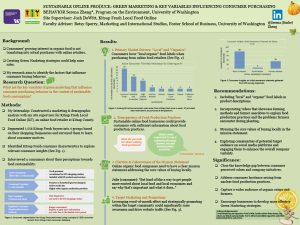SUSTAINABLE ONLINE PRODUCE: GREEN MARKETING & KEY VARIABLES INFLUENCING CONSUMER PURCHASING BEHAVIOR
Though expressing a growing interest in organic food, consumers are not translating this interest into actual purchases. Local organic food retailers, like Kitsap Fresh Local Food Online (KF), are grappling with stagnating sales, with some even falling below the breakeven point. It’s imperative for these businesses to revamp marketing strategies to survive. Failing to raise sales could not only jeopardize the local economy but lead to a loss of a healthy, resilient, affordable, high-quality local food community. The purpose of this study is to find the key variables of green marketing that influence consumer purchasing behavior in the context of sustainable online produce. During my internship, I used literature review, marketing and demographic analysis, surveys, and interviews to answer my research question. I categorized KF buyers into four distinct groups based on their shopping frequencies, and executed tailored questionnaires to each group, focusing on their shopping behaviors. After analyzing 256 survey responses, I conducted interviews with 9 consumers to gain more insights. I found that improving transparency of food production practices and clarifying details of the mission statement would be essential to solve this problem. My internship work including observations and recommendations to KF’s marketing shows consumers want to establish relevant downward communication with the business. The findings can address consumers’ concerns towards buying non organics because they identify transparency and details of consumption impact as primary buying motivations. They’ll help businesses further by developing relevant marketing strategies, and ultimately boost sales and support local farmers and the economy.
